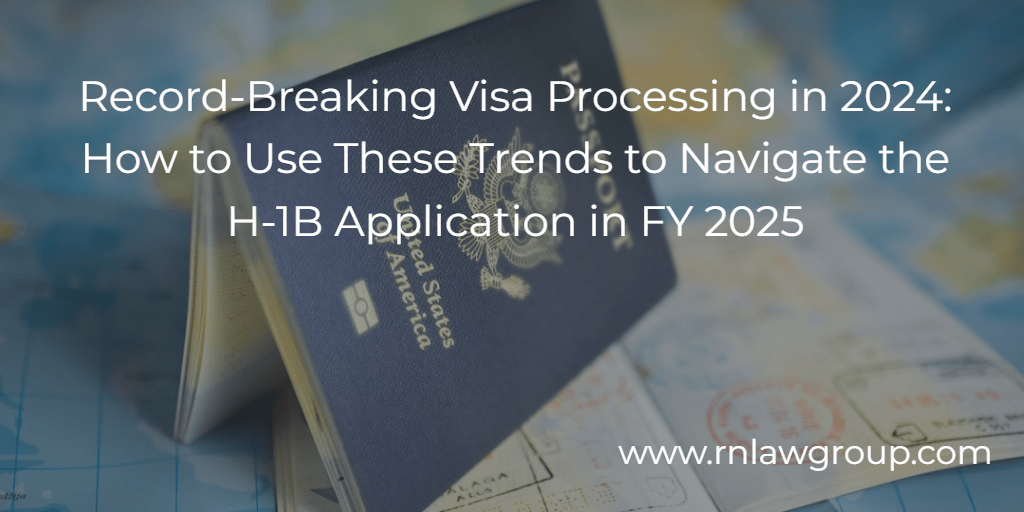
Record-Breaking Visa Processing in 2024: How to Use These Trends to Navigate the H-1B Application in FY 2025
The U.S. Department of State is experiencing a momentous period in its history, marked by unparalleled achievements in visa processing. The Department’s concerted efforts have not only facilitated travel and fostered international connections but have also brought significant economic benefits to the United States. These successes underscore the crucial role of visa operations in bolstering the nation’s economy, supporting job growth, and maintaining national security.
Record-Breaking Visa Issuances in 2023 and 2024
In the fiscal year (FY) 2023, the Department of State issued a near-record number of nonimmigrant visas—over 10 million globally. This impressive total included nearly eight million visitor visas for business and tourism, marking the highest number since FY 2016. Furthermore, half of the U.S. embassies and consulates worldwide processed more nonimmigrant visas than ever before, setting all-time records in visa adjudication.
The momentum from 2023 has continued into FY 2024. In the first half of FY 2024 (October 2023 to March 2024), the State Department issued nearly 5.2 million nonimmigrant visas, surpassing any previous records for the same period. This surge includes approximately 4.1 million B visitor visas and border crossing cards for tourists and temporary business travelers. Notably, our highest-volume missions in countries such as Mexico, India, Brazil, China, Colombia, Argentina, the Dominican Republic, and Ecuador collectively issued more visas than ever before.
Supporting Travel, Tourism, and Economic Growth
The Department of State’s efforts to streamline visa processing and facilitate international travel are critical for the U.S. economy. International visitors have historically contributed up to $239 billion annually, supporting approximately 9.5 million American jobs. The issuance of nearly 4.1 million B visitor visas in the first half of FY 2024 is a testament to the Department’s commitment to fostering tourism and business travel, which are essential drivers of economic activity.
In addition to visitor visas, the Department has been instrumental in attracting international students and exchange visitors. By mid-year FY 2024, nearly 134,000 exchange visitor program participants and 115,000 students received visas. In 2022, international students contributed nearly $38 billion to the U.S. economy, supporting more than 335,000 jobs. The record-breaking issuance of student visas in countries like India and Nigeria further highlights the United States’ appeal as a premier academic destination.
Addressing Workforce Needs and Enhancing National Security
The State Department’s visa operations also play a pivotal role in addressing labor shortages in critical sectors. In FY 2023, a record-breaking 442,000 visas were issued to temporary and seasonal workers in agriculture and other industries. By mid-year FY 2024, 205,000 such visas had already been issued, underscoring the Department’s ongoing efforts to provide lawful labor pathways that support the U.S. economy and protect the nation’s food supply.
High-skilled workers and executives are another vital component of the U.S. workforce. In FY 2023, the Department issued 590,000 nonimmigrant visas to individuals in fields such as emerging technology and healthcare, ensuring that American experts are supported by talented international professionals. Additionally, the issuance of nearly 160,000 nonimmigrant visas to airline and shipping crew members in the first half of FY 2024 has been crucial in maintaining global transportation and supply chains.
Enhancing Efficiency and Security Through Innovation
The Department of State has embraced innovative solutions to manage the unprecedented demand for U.S. visas while maintaining stringent security standards. Expanding the use of interview waivers for eligible visa applicants is one such measure. This allows frequent travelers who meet strict national security criteria to renew their visas without visiting an embassy or consulate, thereby streamlining operations and reducing processing times.
Looking ahead, the Department is exploring new technologies and operational improvements to further enhance efficiency. Initiatives such as domestic visa renewal for select categories are under consideration, aiming to simplify the process for applicants while ensuring robust security measures.
Family Reunification and Immigrant Visas
The timely processing of immigrant visas remains a priority for the Department, reflecting the administration’s commitment to reuniting families and supporting the U.S. economy. In the first six months of FY 2024, over 281,000 immigrant visas were issued, with a quarter of U.S. embassies and consulates setting records for the number of immigrant visas issued. This includes over 152,000 visas for family members of U.S. citizens in the Immediate Relative category, an all-time high for the fiscal half-year mark.
Tips for Successfully Filing an H-1B Nonimmigrant Visa
The H-1B visa program is crucial for attracting skilled workers to the United States, especially in fields like technology, healthcare, and engineering. The U.S. Department of State’s recent successes in visa processing highlight the importance of preparing a strong application. Here are some tips to help you successfully file for an H-1B nonimmigrant visa:
- Start Early and Stay Informed
The H-1B visa application process has specific timelines and caps, especially the annual cap of 65,000 visas plus an additional 20,000 for U.S. advanced degree holders. The application window typically opens in April. Start your preparations early, and stay informed about the latest updates and deadlines from the U.S. Citizenship and Immigration Services (USCIS).
- Ensure Eligibility
Ensure that you meet the basic requirements for the H-1B visa:
- Job Offer: You must have a job offer from a U.S. employer for a role that requires specialized knowledge.
- Specialty Occupation: The position must qualify as a specialty occupation, which typically requires at least a bachelor’s degree or equivalent.
- Educational Credentials: Verify that your educational credentials meet the job requirements. If your degree is from a foreign institution, consider having it evaluated by a credential evaluation service.
- Employer’s Responsibilities
Your employer plays a crucial role in the H-1B process. Ensure they are aware of their responsibilities:
- Labor Condition Application (LCA): Your employer must file an LCA with the Department of Labor, demonstrating that they will pay you the prevailing wage and that your employment will not negatively affect other workers.
- Petition Filing: Your employer must file Form I-129, Petition for a Nonimmigrant Worker, with USCIS. This includes submitting the approved LCA, supporting documents, and the filing fee.
- Accurate and Complete Documentation
The accuracy and completeness of your application can significantly impact your chances of approval:
- Detailed Job Description: Provide a detailed job description that clearly explains the specialized nature of the position.
- Supporting Documents: Submit all necessary supporting documents, such as educational transcripts, degrees, professional licenses, and evidence of work experience.
- Consistency: Ensure that all information on your forms and supporting documents is consistent and free of discrepancies.
- Understand the Lottery System
The H-1B visa cap subjects most applications to a lottery system due to high demand. Understanding this process is crucial:
Random Selection: If the number of applications exceeds the cap, USCIS conducts a random lottery. There is no way to influence the outcome, so focus on submitting a strong application.
- Prepare for Potential Requests for Evidence (RFEs)
USCIS may issue a Request for Evidence (RFE) if they need additional information to make a decision on your application:
- Timely Response: Respond to RFEs promptly and provide thorough, clear, and well-documented responses.
- Professional Help: Consider seeking assistance from a business immigration attorney if you receive an RFE to ensure your response addresses all concerns adequately.
- Consider Premium Processing
If you need a quicker decision on your H-1B petition, consider opting for premium processing. Premium processing guarantees a 15 business day processing time for an additional fee. This can be particularly beneficial if your start date is approaching or if you need to travel.
- Stay Informed About Visa Issuance Trends
The Department of State has been issuing record numbers of nonimmigrant visas, including H-1Bs, demonstrating its commitment to supporting the U.S. economy by facilitating lawful employment pathways. Keep an eye on trends and updates from the Department of State and USCIS to understand the current landscape and any changes in policies or processing times.
Conclusion
The U.S. Department of State’s achievements in visa processing are a testament to its dedication to facilitating legitimate travel, fostering international connections, and bolstering the U.S. economy. The record-breaking issuance of nonimmigrant and immigrant visas in FY 2023 and FY 2024 highlights the Department’s critical role in supporting tourism, education, and workforce needs. For those seeking H-1B nonimmigrant visas, understanding the intricacies of the application process and adhering to best practices is essential.
By starting early, ensuring eligibility, providing accurate documentation, and staying informed about the latest trends and policies, applicants can significantly improve their chances of success. By following these tips and ensuring thorough preparation, you can enhance your chances of successfully obtaining an H-1B nonimmigrant visa. The State Department’s innovative solutions and dedication to efficiency and security ensure that America remains open for business, travel, and international collaboration, fostering a robust and dynamic economy.
Reddy Neumann Brown PC located in Houston, Texas, has been serving the business community for over 27 years and is Houston’s largest immigration law firm focused solely on U.S. Employment-based immigration. We work with employers, employees and investors helping them navigate the immigration process quickly and cost-effectively.
By : Jeanetly Garcia
Jeanetly Garcia advises employers and individuals through all phases of the non-immigrant visa process. As an attorney in the H-1B Department at Reddy Neumann Brown PC she is experienced in filing nonimmigrant petitions and applications for immigrant benefits, as well as, responding to USCIS issued requests for evidence concerning an array of legal issues.

